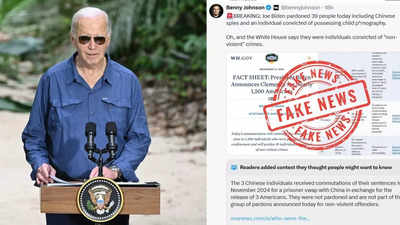
Several social media users, particularly pro-MAGA ones claimed that Biden had pardoned 39 people including Chinese spies convicted of possessing child pornography. However, the truth is more nuanced. Biden did not pardon these individuals. Instead, he commuted their sentences as part of a carefully negotiated prisoner swap, which secured the release of three American citizens wrongfully detained in China.
Clemency vs. Pardon: Understanding the Key Differences
To address the confusion, it is important to differentiate between a pardon and clemency:
- Pardon: A pardon absolves an individual of their crimes and erases the legal consequences of their conviction. It signifies forgiveness and often comes after the individual has demonstrated extraordinary rehabilitation or if the conviction is believed to be unjust.
- Clemency/Commutation: Clemency reduces or eliminates the punishment but does not negate the conviction itself. A commutation, like the one granted in this case, ends imprisonment under specific conditions while keeping the conviction intact.
In November 2024, President Biden commuted the sentence of Shanlin Jin, a Chinese national convicted in the US. This action was part of a prisoner swap that brought home three US citizens who had been detained in China under questionable circumstances.
The Case of Shanlin Jin
Shanlin Jin was convicted in the Eastern District of Texas in 2022 for violations related to the possession and distribution of child pornography under Section 2252A of Title 18 of the US Code. He was sentenced to:
- 97 months in prison
- Five years of supervised release
- Restitution payments of $30,500
Jin had been in continuous confinement since his arrest in January 2021. His crimes were considered severe, leading to significant penalties under federal law. In November 2024, President Biden commuted Jin’s sentence, effectively ending his prison term, but under strict conditions:
- Immediate Departure from the US: Jin was required to leave the country immediately and is permanently banned from reentering.
- No Financial Gains from Publicity: Jin forfeited any potential financial benefits from publicizing his case.
- Future Accountability: If Jin violates the conditions of his commutation, the commutation can be voided, and his original sentence reinstated.
It is crucial to emphasize that Jin’s commutation was not a pardon. He remains guilty of the charges, and his commutation was part of a calculated move to facilitate the release of US citizens detained abroad.
The Prisoner Swap: What Happened?
The three Americans released from Chinese custody as part of this prisoner swap were:
Mark Swidan : A Texas businessman detained since 2012. Swidan had been sentenced to death with a reprieve in 2019 on drug-related charges deemed baseless by aUnited Nations working group.Kai Li : A New Yorker detained in 2016 and sentenced to 10 years in 2018 on espionage charges. His family and the US State Department classified the charges as unfounded.John Leung : An American in his 70s who also held permanent residency in Hong Kong.Leung had been sentenced to life imprisonment on espionage charges after being detained in 2021.
These individuals were exchanged for a small number of Chinese nationals detained in the US, including Shanlin Jin, whose commutation was one of the most controversial elements of the agreement.
Misinformation on Social Media

The claim that Biden “pardoned” Chinese nationals gained traction among certain social media accounts, particularly those aligned with pro-MAGA narratives. This misleading framing painted Biden’s actions as a betrayal of justice, ignoring critical details about the commutation’s strict conditions and its role in securing the release of Americans wrongfully detained in China.
Conditions attached to the commutation, such as permanent deportation and forfeiture of financial claims, underscore that the individuals involved were not forgiven or absolved of their crimes. Instead, the commutations served a broader diplomatic purpose.
The Impact of the Swap
The return of Swidan, Li, and Leung was a significant achievement for their families, who had fought for years to secure their release. These cases underscored the complexities of negotiating the release of Americans detained abroad, especially in nations like China, where legal transparency is often lacking.
For families of other detained Americans, the swap offered hope but also raised pressing questions: What about their loved ones? Advocacy groups estimate that hundreds of US citizens remain detained in China, with some classified as “wrongfully detained” and others facing opaque legal proceedings.
The Broader Debate on Clemency in International Relations
The use of clemency in international prisoner swaps is not new. Past administrations have faced similar controversies, engaging in prisoner exchanges that sparked debates about the ethical and practical implications of such agreements. Critics argue that these decisions may embolden foreign nations to detain more US citizens as bargaining chips. Proponents, however, contend that securing the freedom of unjustly detained Americans often justifies such measures.
Each case presents unique challenges, requiring a careful balancing act between domestic legal standards and the welfare of Americans abroad.
Biden’s Statement on the Swap
President Biden emphasized the humanitarian aspect of the swap, expressing relief at the safe return of the three Americans. While the move sparked political criticism, it aligns with a long-standing tradition of leveraging clemency strategically in the context of international diplomacy.
The administration’s actions reflect a pragmatic approach, prioritizing the release of US citizens while maintaining accountability for those convicted of crimes in the US.
The Last Word
The claim that President Biden pardoned a Chinese national convicted on child pornography charges is unequivocally false. The commutation of Shanlin Jin’s sentence was not an act of leniency but a calculated decision to facilitate the release of Americans detained abroad. Jin remains guilty of his crimes, and the conditions of his release reflect the administration’s commitment to balancing justice with national interests.






